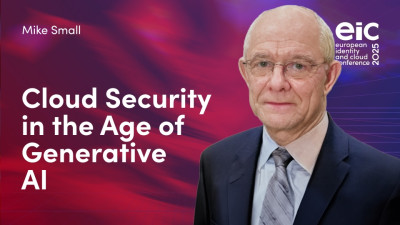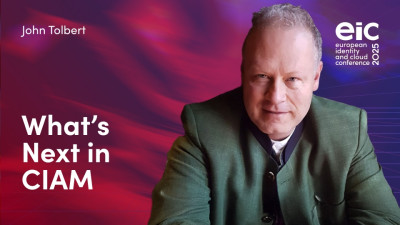Welcome to the KuppingerCole Analyst Chat. My name is Matthias Reinwarth, I'm your host and I'm the Director of the Practice Identity and Access Management here at KuppingerCole Analysts. My guest today is Marina Iantorno. She's Research Analyst with KuppingerCole. Hi, Marina. Good to see you.
Hi, Matthias, I'm glad to be here again.
Great to have you. And we have a huge topic in front of us, some four weeks ago or so, the EIC, the European Identity and Cloud Conference took place in Berlin and online virtually. And we want to take a look back on that event. So we did something that we've never done before and we received some nice feedback. We reached out via LinkedIn to the participants at EIC. Of course we used LinkedIn and social media quite a lot during the EIC and we use it anyway. And the feedback that we got back, really shows how broad the topics are that we cover at EIC. So when we asked for what they liked most, or what was their topic that they're currently researching and working on, we got different aspects of identity and cybersecurity back. And I have a list in front of me. I need to check that because this really was, it was more than 250 sessions and the main focus was for some people on authentication and identification, and especially on the matter of trust and implementing trust and protocols. So these are topics that currently people are working on, of course, an always up-to-date topic is privacy and data protection and legislation and standards. And there's even the prediction that we might have more eIDAS at EIC next year than we had this year. So this is a topic that is also growing. But we also have these niche topics. So niche in quote unquote, something like ethics in identity, ethics also in machine learning. So these are topics that are really interesting and really sparked lots of discussion.
And they are on the rise nowadays, Matthias. Because, you know, with all the changes that are happening, we need to ensure that all the technologies are coping with the regulations.
Absolutely. And not only with the regulation but also understanding that in the end we are dealing mostly with humans, with people who should be at the core, at the center of all the processes that we design when it comes to privacy, when it comes to regulations, but also when it comes to usability, when it comes to bias. So we really need to make sure that these solutions are built with the person, with the identity at the focus, although we are also talking about non-personal identities as well. But now I've talked a lot and why should I invite somebody for a podcast when I don't ask questions? So my question, Marina, you of course also were there and you did quite some interesting sessions. So tell me more about the sessions that you took part in at EIC.
Well, I had the luck to participate in three sessions this year. One of them was with our Principal Analyst, with Martin Kuppinger, and we discussed about the trends and the future of identity access management. We placed a study and then we presented the results and we were thrilled actually with the response from the audience. The response was that good that we created the PDF afterwards. So if anyone is interested in having a look at the trends and the predictions and the statistics that we actually created out of this study, you can go to our LinkedIn page and you can download this PDF. It is available already.
Right. And I think this is really a massive amount of work that you and Martin actually created and then presented there. So there's really a lot of information in there. If we think back to before EIC, we did podcast episodes around trends and predictions, but this PDF is really a massive document, so really interesting for those who are working in that market. So this is really interesting and it's for free. So just go there and download it. The link should be in the show notes as well, so it should be easy to find when you have a LinkedIn account.
Totally, totally. And we are open as well to, to receive some feedback, we are always open to reach out. So it would be good to actually know your comments, so this is the main point of this, trying to bring something to the audience and see how you’re actually responding towards this.
right. Any other sessions that you want to mention when it comes to your participation at EIC?
Yes. Yes. Well, I actually went through a topic that nowadays is very important to discuss, and this is cyber insurance. Since the pandemic, you know, all the attacks, the cyber attacks are on the rise. And it is undeniable, you know, it's something that is happening and with more sophisticated tools as well. the attackers are using more sophisticated tools and at the same time that the cybersecurity is actually improving or getting more sophisticated, the attacks are doing the same. So it is important to have a coverage. However, it is not that easy to get a cyber insurance. Not everybody can get it. And there is a procedure in the middle. So then, you know, there are many, many points that were really worth to touch, especially about the common beliefs. In general it is very common to think that okay, so in the event of a cyber attack, if I have a cyber insurance policy, I just contact the insurer and they get the money from my claim immediately. And it doesn't happen like that. So many times there are investigations in place and it could take a while to actually get paid. So there are many things to consider. It was very interesting. It was a very interesting session and it is also available on demand on our KuppingerCole website. And another session that I presented along with Alejandro Leal, another research analyst here from the company, and it was related to generative AI. I would say that this is another topic that is a hot topic nowadays. And yeah so we cover some aspects, some pros and cons and what is happening in the market and how it actually works. So yes, this were the sessions I took part.
Right, and I think this topic is really a hot topic. Of course, there's no conference right now without covering also the disruptive aspects of generative AI, of machine learning. I had the pleasure also to do some presentations and even a workshop, a four hour workshop on generative AI. So we talked about prompt engineering for four hours and this was really a treat working together with Patrick Parker. And we did that as a pre-conference workshop. But I also took the topic of AI and machine learning, supporting IGA and IAM solutions from the IGA part, from lifecycle management over to access management and to risk management. But from what you're saying and what Alejandro and you said in your presentation, this will be a game changer, is this true?
It is. It is. Well, actually you just mentioned a couple of areas where AI and machine learning could be used. In IGA, for example, but there are many other areas, we have healthcare, marketing, art, cybersecurity, for instance. Now, for example, the main question is, who are creating the code? So is it a tool like ChatGPT, or is it a programmer who is actually doing it? In education, this is a big crush for instance. Because it is important to actually know who created this. So, is ChatGPT for instance one of the co-creators of the papers nowadays? So what is happening? And I would say, you know, we cannot avoid the tools. That is something that history showed us is that we cannot stop the technology. We have to adapt to it. So we must adjust and we have to try to use this as a tool to help us. Something that we need to keep in mind is that all the machines are trained with the static data, so maybe not all the information that we get is up to date. It means then that AI is not really replacing humans, but they become actually a tool that helps to make our jobs or our work easier. And this would be actually the main point of generative AI. Now if we consider all the industries that are using it is actually a game changer, as you mentioned at the beginning. DALL-E, for example, is a tool that is helping to create whole marketing campaigns. According to the audience that we want to direct the message. So it is incredible what is happening.
Right, and when we look at the area of IAM and IGA, there are already also other mechanisms to use machine learning and to apply to the actual data that is created at runtime by the systems. So to learn from what should be expected as usual, as normal, as expected to identify the outliers, to identify that something is going on that is not really expected. But in the end we really need a business case, there always needs to be something where machine learning can actually deliver value and that is where it gets interesting. And when there is lots of work to do that is repetitive and always boring, and all the same, we should make sure that our experienced and expensive collaborators are not doing that, but can focus on the more important, the more decisive work that is really around there. So we can really get rid of the heavy lifting. So we really need to make sure that we get there.
But one more thing, Matthias, something that we need to consider, because you mentioned about the data and about the outliers, so also we need to know what is the data that we are using to train the machines? Because if the data is actually not good, the results or the outcome would not be accurate. So then these are things as well that have to be considered. So what I mean to say is we cannot rely 100%, but we can actually use these tools to improve or to recreate something, for instance. This is what is happening in art, but there are things that of course, need the human interaction and they need... Yes, actually that is the word, I think the interaction, this interaction between humans and the machines and how these two can actually work together. And this is what we are trying to adjust nowadays
Right, so from what we've talked about right now, we understand that. Machine learning and generative AI was one of the key topics. If we take one step back or if you take one step back, what would you consider to be the core topics of EIC, if we look back at these four days in Berlin?
Well, so machine learning is a core component of generative AI. So I would say that these two areas are going together. Our principal analyst, Martin Kuppinger, he mentioned in the closing keynote decentralized identity, policy based access everywhere and machine learning. So if we think about that, it actually makes a lot of sense. Since the pandemic, people have started with this trend of working from anywhere. And it is something that is not likely to change, you know, in the future, it is actually something that I believe that it came to actually stay in the work environment, when possible, right? And it opens the door to the need, let’s say, you know, to the need to have other policies or to identify who is actually accessing the data to protect the assets, right? So, decentralized identity is actually an alternative that can be used because it allows individuals to own and to control the digital identity. It includes as well personal data, personal credentials. And if you think about that, also digital wallet, that this is something that that is going on and is something that probably, you know, will change along with the market because there are different progresses that are happening in this area. Now, of course, the idea is to create something that is secure and private for online interactions and give them, you know, let's say, greater portability of the digital identities across different services and platforms. And this is something that is ongoing, and the same with the generative AI and machine learning. So these two are actually working as well. And up to a certain point, let's say, we can actually rely on the chat bots, it either reduces as well the number of people that that are working in a company, for instance, or the time that a user is waiting to receive an answer, you know. So then I would say that these topics that Martin Kuppinger mentioned are actually going right the way to the point.
Yes, absolutely. I think these were three core topics, but as mentioned, it was more than 250 sessions with workshops, with moderation, with lots of interaction between people. For those who are interested and who have not been there, shame on you. But nevertheless, if you want to rewatch these sessions, there's an option to get access to the EIC 2023 recordings as well. And if you were there and you did not have the chance to be in five rooms at the same time like I did, it's a lot of material to catch up upon,
Yes. And I absolutely encourage you to do check on these sessions. The agenda is still available online. So then we can see all the sessions there. And there are many, many interesting topics and many good speakers as well, you know, because of course, we had more than 200 speakers. It's like a lot of people presenting interesting topics. So maybe, you know, if in the event there was no that possibility as you said to be in different rooms at the same time or maybe you needed more breaks between session and session. So then having the possibility to watch the material online is fantastic.
I fully agree. And before we go into another direction, I just want to provide my thank you to those who replied to our LinkedIn call for feedback. That was really nice so we could really gather this information and use it for preparing this podcast episode. If you take another step back, Marina, when you think of EIC this year, what was your personal experience and what would be your recommendations apart from the technologies, apart from the core stuff that we do, which is AI, which is IAM, which is IGA, which is figures in your context, what would be your key takeaways for EIC and how to prepare for next year?
Well, personally I would say, my experience was amazing because I was a speaker. So then I had the opportunity to talk about topics where I really have knowledge about, for example, AI or cyber insurance and I am a statistician as well. So then presenting the numbers after the study that we placed, was actually very good. As well, I had the opportunity to moderate different panels and when you moderate different panels, it means that you are talking with different speakers and you attend indirectly the sessions because you are already there and the insights are actually very good and you learn what is really happening in the market. Which is important because we need to actually be up to date with all these things. Now regarding the coming EIC, I would say my suggestion would be for any person who plan to attend to plan in advance because there are many sessions ongoing. This year, it was amazing because we had more than 200 speakers and I expect that there would be something similar in 2024. So the agenda is available online several weeks before the event. So people can actually check out who the speakers are, whether the sessions that they would present and then they can plan their attendance. So then in that sense they can actually get the most of it. As well, the EIC is a great place to boost the networking because during the breaks for example, people start talking between each other, they're having conversation, discussing about the sessions and it is important to engage with other people because later on, we never know, maybe you end up creating professional interaction for future collaboration, so we never know where it can end. Also, use social media. Most of us, we use LinkedIn and many attendees also use it. So if there is something that gets your attention, for example, you can actually go to a different room or try to engage with attendees who are actually having conversations about topics that are of your interest. And this also creates the possibility to talk with other professionals. And as well, follow up after the sessions, this is something really important as well because many people are shy to approach the speakers. But I would say that you can actually approach them or contact them, for example, in the social media or after just the sessions to discuss about what they presented. It actually helps to maintain the connection. And of course, so there is a possibility to continue the learning, this is something ongoing and it's not something static. It is changing all the time. So maybe having a connection with a speaker who is an expert in the field and follow this person would actually help you as well to understand what are the changes in the market. And yeah, and try to attend. So that would be my best advice, try to attend because it is a great event. I would say one of the best ones to learn about identity, about identity access management, about cloud and about AI. So then that will be fantastic. I really look forward to seeing you at the next EIC.
Absolutely. And to summarize our today's episode: first, if you have not yet done that, pick up the study that Marina and Martin have created, it's available for free on LinkedIn and the link should be somewhere around this video and in the show notes for this episode. Second, join EIC. Three, maybe revisit some of the talks from EIC, they are available on our website just for free and some on YouTube and you can have access to the full EIC and retrospective as well. And to follow up on what you just said, Marina, starting early with following in the event it's really of importance and although I'm the director of the Practice Identity and Access Management, I want to give a a quick heads up for an event that will take place by the end of this year in November in Frankfurt, which will be called cyberevolution with a great concept. It will be a cybersecurity event with a bit of more, with a bit AI sprinkled in and lots of other topics. Very modern, a very, very new approach towards a cybersecurity++ event. So if you go to our website and look for cyberevolution, there is already content around, and you can have access to the first list of speakers, of the topics and exactly what you, Marina, just said, start early, watch that space and if you like what you see, join us and Frankfurt as well. So that will be in November this year. So that will be the second great event that we plan to do and to execute. Anything final, famous last words, Marina, to add from your side?
Yes, try to join us to this event. So cyberevolution, I believe that it will be very interesting because of what you said. So there are different things that are changing the game nowadays, so then it would be great to have you.
Right. New format, new name, new topics. See you in November there. But until then, follow up on EIC and join us next week for a new episode of this Analyst Chat and leave your feedback on YouTube, in the comments, or reach out to us, to Marina, or to me just by email. Or via LinkedIn. I’ve just forgotten that. Thank you very much Marina, for joining me today for having this retrospective on EIC, four weeks after the event has taken place, and looking forward also to seeing you in person again soon.
Thank you, Matthias, same here. Have a great day.
Have a great day. Bye bye. And thanks to the audience for listening.



















































